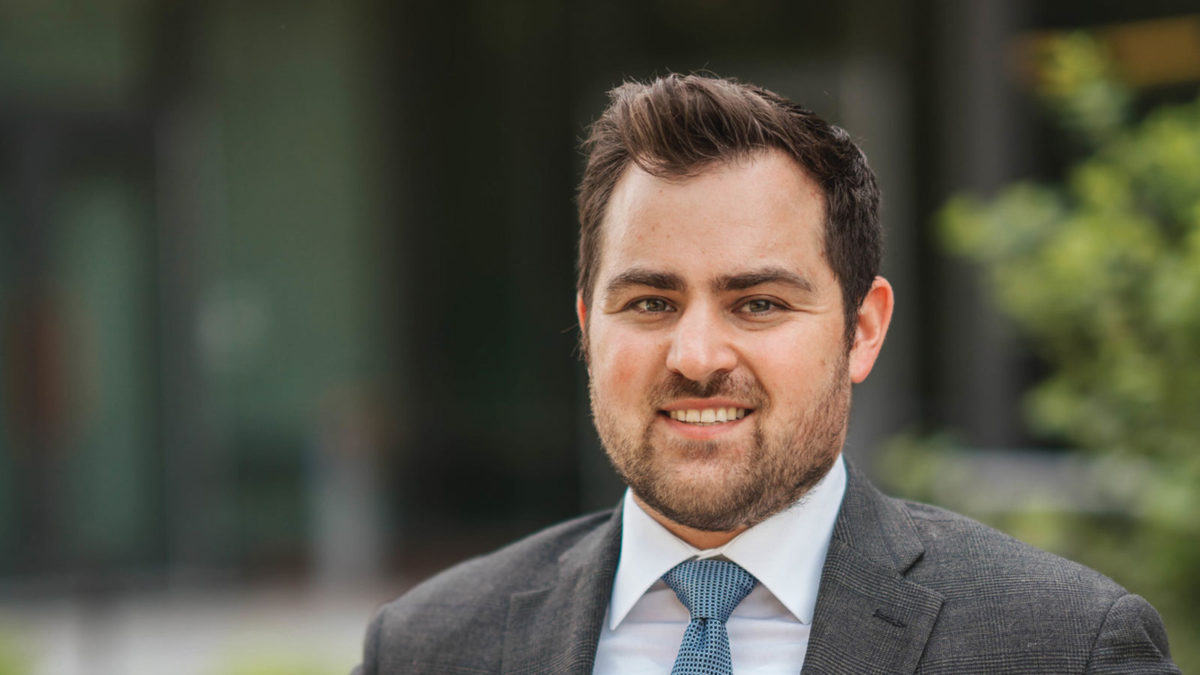
Being Laurence Gendelman
August/September 2021
Download This Article (.pdf)
“We will not, under any circumstance, take a position in a case, or make any argument, which we believe, in our sole discretion, may result in the following: (a) direct and imminent harm to a child or at-risk person; (b) the commission of a crime or fraud; (c) a course of action that we consider to be repugnant or which we have a fundamental disagreement with; or (d) harm to the civil rights of any protected class, including LGBTQ persons.”
—Excerpt from Laurence Gendelman’s client engagement agreement, 2021
As his engagement agreement demonstrates, Laurence Gendelman is committed to eradicating inequity in the legal community and in the justice system. He served as president of the Colorado LGBT Bar Association during the pandemic. He generously and regularly teaches and gives presentations for CBA-CLE, including the state judicial conference, and he works with the CBA Trust and Estate Section, all while keeping the plates spinning at his law firm, which handles domestic relations cases, probate matters, and estate work.
Laurence is a 32-year-old gay Jewish lawyer who knows he is “coded by my voice and coded with my last name,” and who is “unapologetically me.” His story contains those relatable nuggets of our own humanity.
Early Life Lessons
Laurence was born and raised in Los Angeles until age 5, when his mother and father moved with their only child to Denver immediately after California’s Northridge earthquake in 1994. Laurence’s parents divorced two years later, and he lived mainly with his mom. His parents didn’t get along that well: “My dad was married five times, which gives some insight.” After graduating from Cherry Creek High School, Laurence attended the University of Colorado at Boulder.
CU offered a program in multicultural leadership, including a residential academic program where all the program students lived on the same floor of the residence hall. Laurence remained in the leadership program all four years and graduated with majors in economics and political science as well as a certificate in leadership. In his sophomore year, he became a residential advisor (RA) for that academic program. He remained an RA until one fateful night, at the ripe old age of 20, he was caught drinking in the dorm, just two weeks before the end of the academic year.
Laurence immediately entered into a justice system that seemed to him anything but just. At that time, he had been working for the university doing community justice circles for offenders and working on restorative justice. The university fired him from that and his RA position, and he was placed on university probation for the following year. Laurence, who had always self-defined as a “slightly above average good kid” on a leadership path, suddenly felt derailed and defined by a 20-year-old’s “rule-breaking-nobody-got-hurt dumb incident.” It was a traumatic experience for a kid who held the same Safeway job from age 16 until he went to law school.
His ego-striking misadventure led to hours of required attendance at Boulder County Mediation Services. While attending that program as an “offender,” he became acquainted with the director, and soon the offender was offered an internship with Boulder County Mediation Services. The experience stoked his interest in community justice. Laurence fondly recalls the person who took him in, saw his worth, and offered the internship as a way for him to remedy his wrongs. “I will always remember him and his kindness and caring. He was an early role model for me.”
Eventually, his mediation work led to a position as a deputy probation officer, and soon after, he became a contract probation officer with Boulder County. It was during this job that he decided to go to law school so he could become a district attorney.
The Path through Law School
In applying for law schools, Laurence had to disclose his college drinking infraction and involvement with the justice system. His ego screamed at him that this minor infraction was going to follow him until the day he died. This same disclosure pain arose three years later when he applied to sit for the Colorado bar exam. “It was driven home to me that ‘the system’ has a memory.” It also seemed to Laurence that perceived infractions by persons in leadership bear heavier consequences based on broader expectations.
Laurence attended Suffolk University Law School in Boston for one year. He wanted to transfer to CU Law School, so he made a plan. He called the law school admissions office and said he was going to be in the Boulder area over spring break and would like to interview in support of his transfer application. Despite saying an interview wasn’t common or necessary, the admissions officer agreed to the interview, and Laurence immediately bought an airline ticket to Denver for the interview (and to visit his mother, of course).
Laurence arrived for the interview fully prepared to make his case. But the secretary told Laurence that the admissions officer was out at an emergency dental appointment and would not be back in time that day. Although disappointed to not have the interview, Laurence struck up a conversation with the secretary, and they talked for a very long time about every topic under the sun. Laurence then drove to the airport and got on the plane to Boston. As he landed in Boston, he received an email with his acceptance as a transfer student to the University of Colorado School of Law. He will never forget that secretary nor her caring and kindness.
While at CU Law, Laurence scored an internship with the Boulder County District Attorney’s office. He enjoyed working in the county courts because he was given autonomy to resolve cases creatively and could ensure the punishment fit the crime. However, when he moved over to jail duty, he found it impossible to work within that system. He perceived unfairness in a criminal justice system that seemed to punish homelessness and mental health disorders.
The consequences often seemed disproportionate for very minor offenses. Once in the system, there can be extraordinary requirements that make it hard or impossible to get or maintain a job, such as paying fees and attending classes, which can “make failure easier than trying to rise above it.” Laurence’s goal of becoming a DA no longer existed for him. As he puts it, “I’ve got to sleep at night knowing that day I did something good in the world, and that job was not going to let me sleep.” An admitted control freak, Laurence participated in the entrepreneurial law clinic at CU and used other school resources to find a path in his non-DA future. He found he enjoyed the transactional parts of a law practice, which would serve him well over time.
Laurence had come out as a gay male in his undergraduate sophomore year. Fortunately, he never worried about parental acceptance, but he was concerned about the unknown social cost. “For me, that was the hesitancy of coming out—the marginalization of gay men, reduced to a sexual identity.” By the time he was in his second year of law school, he was the law school liaison to the same Colorado LGBT Bar Association he would lead eight years later.
In his senior law school year, Laurence clerked at a law firm specializing in personal injury work involving birth injuries. He was introduced to the inequities of the health care system for impoverished women of color in this country. The combination of personal injury and civil rights law met his “sleep test.” However, he lacked some functional anatomical information that would make his law clerk research easier. One of the law firm’s paralegals took him to lunch for a crash course about vaginas and how they really function during labor and childbirth. He unabashedly told her “I don’t know anything about these,” and so their Q&A session began. Her name and kindness have not been forgotten.
Serving the Legal Profession
Upon graduation, Laurence went to work for a Denver domestic relations law firm. Again, he realized he enjoyed the business side of law practice. Later he worked with a small trust and estates firm for about a year and a half before striking out on his own. He opened Gendelman Law Group in June 2017. Within eight months he had a paralegal, and two months later he had an associate. He had six employees at the end of two years. He marketed unbundled legal services and offered payment plans in domestic relations cases to get his business off the ground.
Laurence always availed himself of legal and business networking opportunities. He met Nick Klimas at a networking event, and in February 2020 their offices merged—right before the pandemic. Despite the challenging conditions, Gendelman Klimas Ltd. now has eight employees, and they recently bought an office building in Uptown Denver. He is very aware of the need for diversity and inclusivity in law firms. His firm currently has two openly LGBTQ employees and two employees of color, “and this is not enough.” He values the active engagement of inclusivity.
His quick laugh and willingness to share his time and insights, coupled with his ability to talk with anyone about anything have served him and our legal community well. Laurence’s self-described bluntness is always coupled with kindness, both expressing his own and remembering that which was shown to him over the years. He has a strong sense of fairness that doesn’t abide inhumanity.
In discussing the path to success, his words are succinct. “The sooner you accept yourself the sooner you will (a) be successful, and (b) learn to use your differences as your advantage.” 
In applying for law schools, Laurence had to disclose his college drinking infraction and involvement with the justice system. His ego screamed at him that this minor infraction was going to follow him until the day he died.


